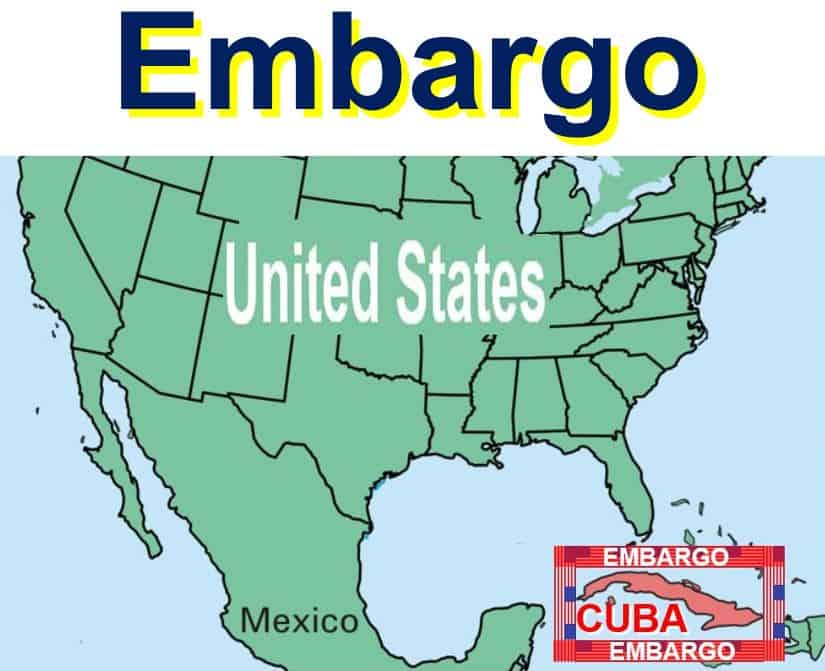What is an embargo? Definition and meaning
An embargo is an official ban on importing, exporting or taking part in specific commercial activities with a specific country. It may also refer to an order by a government to forbid ships from entering or leaving its ports. Embargoes are types of economic sanctions.
Embargoes, which are often created as a result of unfavorable political or economic circumstances between nations, are commonly imposed by groups of allies simultaneously.
The aim is to isolate the country and hopefully force it to comply with international laws and treaties, or withdraw troops after invading a country illegally.
 The United States embargo against Cuba, known in Cuba as ‘El Bloqueo’ (the blockade), was first imposed in October 1960. In February 1962, the embargo was extended to include nearly all imports.
The United States embargo against Cuba, known in Cuba as ‘El Bloqueo’ (the blockade), was first imposed in October 1960. In February 1962, the embargo was extended to include nearly all imports.
The United States and its closest allies – the UK, Canada, Australasia, Western Europe, Japan and South Korea – will usually carry out embargoes together against one country, the most recent one being Russia after it annexed Crimea and sent troops into Ukraine.
Some embargoes might also come with other measures, such as freezing the bank accounts of specific individuals or companies, or refusing to grant tourist visas.
Strategic or trade embargo
A Strategic Embargo: bans the sale or any type of exchange of military equipment with a country. It usually forbids the sale of any goods that make a direct contribution to the nation’s military power.
A Trade Embargo: focuses on commercial activities, i.e. imports and exports plus financial/banking services.
Most countries today are very dependent on international trade, and suffer significantly if their ability to import and export goods and services, plus their access to financial instruments and services are undermined.
Lawmakers say trade embargoes are powerful and effective weapons. However, many historians point out that in the vast majority of cases, they are not very effective, take a very long time to change a country’s behaviour, and tend to harm normal civilians much more than the people in charge.
In many cases, the country imposing the embargo is also harmed economically. If, for example, your target country buys 10% of your exports and you suddenly cease trading, many companies in your country will suffer.
An embargo is an economic warfare tool that may be deployed for a variety of reasons, including:
- To demonstrate resolve; show to the target nation that you are not bluffing.
- A tit-for-tat action; retaliation for another nation’s actions.
- To send a political signal.
- To try to force a country to alter its behavior.
- To deter a nation or its leader from engaging in undesired activities.
- To weaken the target country’s military might.
Types of embargoes
There are many different types of embargoes, which can be either total or partial:
- Banning or limiting exports and/or imports.
- Creating quotas for quantity.
- Imposing special levies on goods and/or services.
- Banning freight, transport vehicles or aircraft from traveling in a country’s territory, airspace or waters.
- Freezing or seizing bank accounts.
- Limiting the delivery of certain technologies or high-tech products.
According to businessdictionary.com, an embargo is:
“Official suspension of import and/or export of some specific or all goods, to or from a specific port, country, or region, for political, health, or labor related reasons, for a specified or indefinite period.”
Embargo can also mean blocking all news broadcasts regarding a specific event, as in “The police asked for a news embargo while they tried to locate the kidnappers.”

